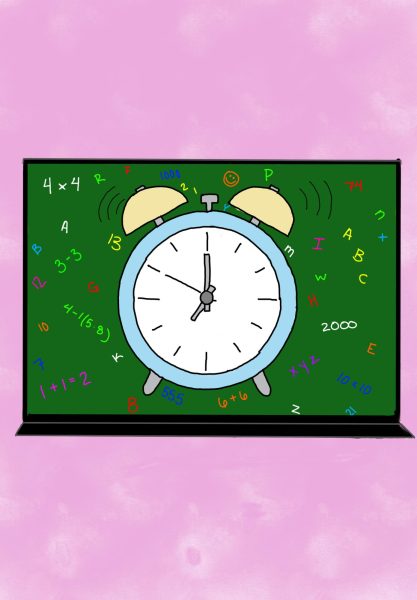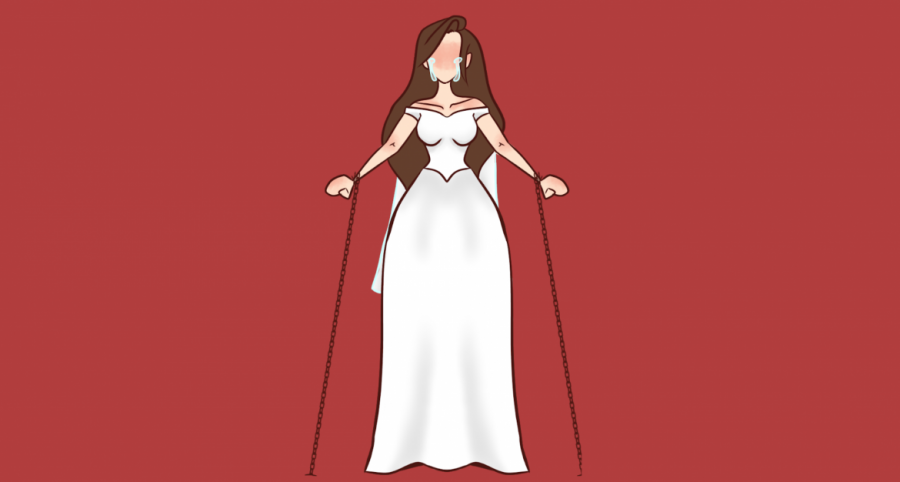The “Mrs” title promotes gender inequality and discrimination
Women shouldn’t have to share and be unfairly labeled by their personal marital status
A woman should not be higher than or at all set apart from other women because of her marriage or lack thereof.
This is The Mav’s third editorial of the 2020-2021 school year. Editorials are articles written by a publication’s editors to express a shared opinion or discuss a topic the editors think needs more attention. These articles are meant to persuade readers and to promote critical thinking while sometimes encouraging people to take action.
The title of “Mrs” is seen today as a label of female marital status. But throughout the 19th and 20th centuries, this title did not have any marital connotations at all. Instead, it was an outward statement of power and hierarchy. If a woman governed slaves, servants, or apprentices, her social status was slightly below a man, “Mr”, who also governed lower class individuals. Comparatively, if a woman had the title of “Miss”, it immediately implied that the woman had very little or moderate wealth, very little or moderate power, or, depending on her age, worked as an illegal prostitute.
This may not be true in the modern era; however, unfortunately, many of the negative connotations that come along with female titles are still in the foundation of our society today.
We all remember that awkward time in elementary school when we were talking to an adult and didn’t know if we should say “Miss” or “Mrs”. We frantically look for clues to make this determination: are they wearing a ring on their left hand? Do they have photos of them and their significant other nearby? These are questions we should not have to ask ourselves.
When people are being forced to guess or ask whether a woman is currently married or not as part of an early introduction, it is degrading to women as it assumes women have to be married. It tells women that their social status is defined by whether they have a spouse instead of their knowledge, beliefs, and personality traits. It implies that all women are defined by their relationship to a man, whether that be her father (Miss) or her husband (Mrs).
Are women nothing more than their marital status or who they “belong” to?
In addition to the implication of women being nothing more than property, there are inherent issues with using this title in an educational setting, specifically with young children. If a child is taught to look for clues or even blatantly ask a woman whether she’s married or not after first meeting her, children grow up believing that the value and status of women comes from that very title — that the association with her name must be her primary purpose in society.
Though we often view the 21st century as a time where social issues are being addressed significantly more than they were centuries ago, that isn’t necessarily true. Modern recognition of women’s rights is still not where it should be as evidenced by the degrading labels attached to women’s names.
A woman should not be higher than or at all set apart from other women because of her marriage or lack thereof. It’s the 21st century after all. If we truly want to look at gender equality from a social standpoint, a good place to start is changing the way we view and talk down to women. Equality starts with what we say and what we believe.
Women should not be separated from one another by something as small as marriage. They need to stand together as one group of people. Judgement and separation never make any group of individuals stronger.
Though many were brought up being taught it’s acceptable to address women by these labels and don’t necessarily attach it with their personal opinion about the woman, it is still degrading, offensive, and even discriminatory. Whether we mean to do this or not, we need to recognize that our words have power, even seemingly innocuous ones.
Men are not asked their marital status upon first meeting them. Why should women be?
Men are not grouped by whether or not they have a spouse. Why should women be?
Men have the same title regardless of their marital status. Women should be afforded the same courtesy.
Your donation will support the student journalists of Mead High School. Your contribution will allow us to purchase equipment and cover our annual website hosting costs.








Alaina Metivier • May 24, 2021 at 12:22 pm
I didn’t know about the history, but ever since my 8th grade teacher pointed out to me that men get “Mr.” regardless of their marital status and women get “Miss” or “Mrs.” depending on their marital status, this has bothered me! I’m all about the “Ms.” and this article really supports me in continuing to do that! – Ms. Metivier
Arizona Lee • Feb 10, 2021 at 4:03 pm
Ms. Long — Thank you so much for reading and commenting on The Mav’s third editorial piece this school year! To answer your question regarding our proposed solution, we believe it would be most productive in progressing towards gender equality if we were to simply use the title of ‘Ms.’ to address female adults. In reality, it does not matter what title is used as long as we establish (as a society) that there are no marital connections. That singular, all inclusive title would most likely be ‘Ms.’ due to it’s modern use in everyday conversation and similar sound when compared to ‘Mr.’, the title for adult males.
Dusty • Feb 10, 2021 at 10:34 am
I had never thought about this before, but you have got me thinking—yes, it is only fair to use the same title for a woman whether or not she is married. I especially liked what was said about not having to look for clues as to whether or not the woman’s is married in order to figure out what to call them.
Gina Bare • Feb 9, 2021 at 11:13 pm
So good!!!
Ms. Schmitt • Feb 9, 2021 at 8:33 pm
This is so well-written! Thank you for sharing your thoughts, as well as some history.
-Ms. Schmitt
Pogo • Jun 24, 2024 at 9:16 am
OUTSTANDING ARTICLE – WELL WRITTEN !! True equality means that every female be addressed by her legal *first name – not a descrimatory gender label. MS/Mrs is never put in front of our real legal birth name on our charge cards /bank accounts, tax or legal records. I *insist* that I be addressed by my first name when I go to doctor’s office or my bank, or business. I firmly Ire-educate phone callers to not address me by gender label MS by asking them ” What is the name on my business account with you. (it doesn’t include MS). Also, I ask callers, especially if they are female, what is the name on your company name tag?
(It is always firstname-lastname – with no MS/MrS.) . I hope every female who reads this comment will take a strong active step forward to change the business and medical community to recognize us by first name only is they want our business. signed – a happy energetic retiree. June 2024
Rachel Long • Feb 9, 2021 at 1:47 pm
I didn’t know the historical reasons for using Miss vs Mrs. Do you propose using Ms, or how would you then address a female adult?